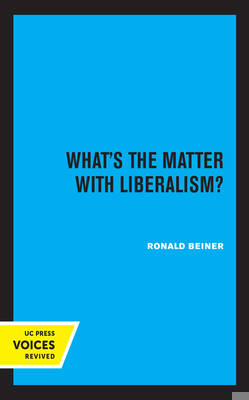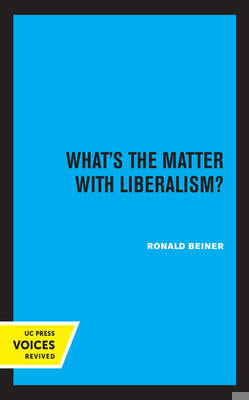
- Retrait en 2 heures
- Assortiment impressionnant
- Paiement sécurisé
- Toujours un magasin près de chez vous
- Retrait gratuit dans votre magasin Club
- 7.000.0000 titres dans notre catalogue
- Payer en toute sécurité
- Toujours un magasin près de chez vous
Description
What's the Matter with Liberalism? by Ronald Beiner confronts the triumphalist mood that swept the West after the collapse of socialism in Central and Eastern Europe. While liberal democracies congratulated themselves on their victory, Beiner--drawing on Václav Havel's warnings--asks whether consumer-driven societies conceal their own "latent tendencies" toward emptiness. Instead of taking liberalism's superiority as self-evident, he probes its limitations, arguing that a political philosophy reduced to tidying concepts or offering policy tips cannot account for the deeper questions of human purpose and civic life. Beiner reimagines political theory as a form of truth-seeking narrative--storytelling that illuminates who we are, what we value, and what we risk becoming. He draws on Aristotle's notion of "ethical fitness," cultivated like physical strength through habituation; on Iris Murdoch's defense of literature as a medium of truth-claims about human life; and on Hannah Arendt and Walter Benjamin's vision of history as redemption for the defeated and critique of "progress" as a pile of debris. From this perspective, liberal neutrality is exposed as far from neutral: by privileging consumer choice above all else, it structures economies, cities, and even imaginations around a narrow vision of the good. Beiner calls for recovering a more substantive philosophical anthropology--one attentive to needs, virtues, and civic purposes--so that political theory can once again articulate richer accounts of character, community, and freedom. Engaging liberalism's critics and allies alike, What's the Matter with Liberalism? is both a diagnosis of liberalism's blind spots and a bold appeal to expand the horizons of political reflection. This title is part of UC Press's Voices Revived program, which commemorates University of California Press's mission to seek out and cultivate the brightest minds and give them voice, reach, and impact. Drawing on a backlist dating to 1893, Voices Revived makes high-quality, peer-reviewed scholarship accessible once again using print-on-demand technology. This title was originally published in 1992.
Spécifications
Parties prenantes
- Auteur(s) :
- Editeur:
Contenu
- Nombre de pages :
- 210
- Langue:
- Anglais
Caractéristiques
- EAN:
- 9780520328693
- Date de parution :
- 01-09-20
- Format:
- Livre broché
- Format numérique:
- Trade paperback (VS)
- Dimensions :
- 152 mm x 229 mm
- Poids :
- 312 g

Seulement chez Librairie Club
+ 135 points sur votre carte client de Librairie Club
Les avis
Nous publions uniquement les avis qui respectent les conditions requises. Consultez nos conditions pour les avis.





